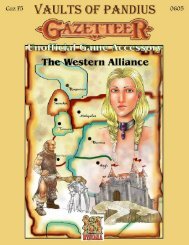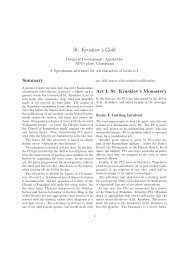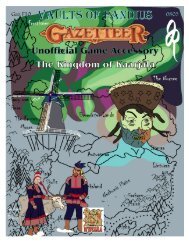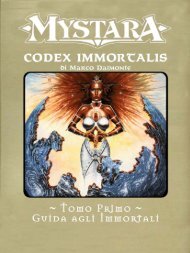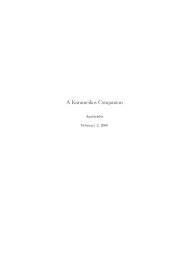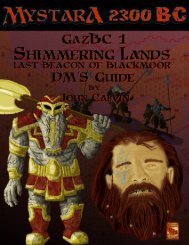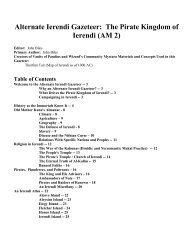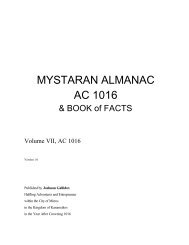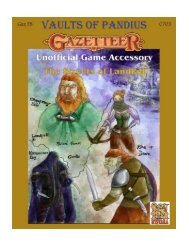The Kingdom of Littonia - Vaults of Pandius
The Kingdom of Littonia - Vaults of Pandius
The Kingdom of Littonia - Vaults of Pandius
Create successful ePaper yourself
Turn your PDF publications into a flip-book with our unique Google optimized e-Paper software.
SOCIETY<br />
leaves (for men) and flowers (for<br />
women), and decorate their homes with<br />
thorns and rowan branches. Festival fires<br />
are also lit, and burn from sunset to<br />
sunrise, and during the night people leap<br />
over them to ensure prosperity and<br />
fertility for the coming winter. Herbs<br />
gathered during Jāni are thought to<br />
possess magical powers.<br />
Currency and Trade<br />
<strong>The</strong> people <strong>of</strong> <strong>Littonia</strong> have used<br />
currency for centuries. <strong>The</strong> ancient<br />
Valoin used amber shards <strong>of</strong> various<br />
sizes as a crude form <strong>of</strong> money – a<br />
system that remained in place until the<br />
rise <strong>of</strong> the first <strong>Littonia</strong>n kingdom under<br />
Namejs, who minted silver coins in<br />
varying denominations. During the<br />
chaotic period that followed, many <strong>of</strong> the<br />
larger petty realms that arose minted their<br />
own coins, or used a mixture <strong>of</strong> old silver<br />
pieces and amber.<br />
With the rise <strong>of</strong> the second kingdom<br />
under Karlis, a new currency, based on<br />
the golden lats, was instituted. Each lats<br />
is subdivided into 100 tiny silver santīmu<br />
(sing. santīms, worth 1cp). To further tie<br />
his subjects together, Karlis ordered the<br />
seizure <strong>of</strong> as many old coins as possible,<br />
and melted them down – it is still<br />
possible to find old coins in treasure<br />
hoards and the like, however.<br />
Although the <strong>Littonia</strong>ns have been<br />
trading amongst themselves, and to a<br />
lesser degree with the Kaarjalans, for<br />
centuries, international trade as it would<br />
be understood in the Known World<br />
commenced relatively recently. <strong>Littonia</strong><br />
manages to feed itself in all but the worst<br />
years, but it does not export food. <strong>The</strong><br />
kingdom is rich in timber, wool, and<br />
silver – all <strong>of</strong> which it exports. Its most<br />
valuable commodity is amber – petrified<br />
pine pitch – which is <strong>of</strong>ten found in great<br />
quantities on the beaches. <strong>Littonia</strong>n<br />
amber is gaining a reputation throughout<br />
the north for being <strong>of</strong> exceptional quality,<br />
and it is favored by many magic users<br />
whenever amber is needed as a spell or<br />
alchemical component. As a result, the<br />
market value <strong>of</strong> such amber is <strong>of</strong>ten twice<br />
or three times greater than specimens<br />
from the Known World. High-value<br />
transactions, particularly with foreigners,<br />
are sometimes conducted using amber<br />
jewelry.<br />
Governance<br />
<strong>Littonia</strong> is a monarchy, ruled by Karalis<br />
Uldis VI. Historically, the king ruled as<br />
an absolute monarch, but the reign <strong>of</strong><br />
Karalis Egils (AC 442-454), which was<br />
characterized by heavy tax increases and<br />
poorly planned military campaigns<br />
against the humanoids, prompted several<br />
nobles to rise up in rebellion. After the<br />
king was deposed, the nobles established<br />
an informal parliament, or Saiema, to<br />
advise the king’s son, Māris IV, until he<br />
reached majority. <strong>The</strong> nobles ensured<br />
that the Saiema (whose membership<br />
consisted <strong>of</strong> themselves) became<br />
established at court, and since that time<br />
every reigning monarch has been advised<br />
by this body. It is composed <strong>of</strong> the<br />
nobility and, more recently, at a previous<br />
king’s request, the wealthier landowning<br />
gentry.<br />
<strong>The</strong> Saiema is responsible for advising<br />
the ruler on matters <strong>of</strong> state and trade,<br />
and for ensuring that all laws pronounced<br />
by the ruler are followed throughout the<br />
kingdom. Membership is for life, and<br />
awarded to nobles who have recognized<br />
estates (i.e., dominions), or gentry whose<br />
private property is worth at least 20,000<br />
lats. Eighteen members represent the<br />
nobility, who are responsible for<br />
appointing their own successors, and the<br />
remaining nine are appointed by the<br />
ruler. <strong>The</strong> noble faction has <strong>of</strong>ten<br />
claimed that the king’s appointments to<br />
the Saiema have been wealthy merchants<br />
who won their posts through bribery, but<br />
this has never been proven. Being a<br />
largely informal body, the Saiema meets<br />
whenever its members agree to do so,<br />
and, as motions are carried by a threequarters<br />
majority, debates are always<br />
raucous affairs.<br />
In addition, each town and village is<br />
governed by a local council, which<br />
manages daily affairs. <strong>The</strong>se local<br />
councils are under the direct authority <strong>of</strong><br />
the landed noble that controls the<br />
15<br />
surrounding region, but in most cases<br />
towns and villages are left to govern<br />
themselves as long as they remit<br />
sufficient tax revenues.<br />
Taxes are levied on an annual basis by<br />
the landed nobles, acting through their<br />
seneschals, who then remit it to the king.<br />
Although the date <strong>of</strong> assessment varies<br />
among the regions, it usually falls within<br />
a week after the shortest day <strong>of</strong> the year.<br />
Typically, commoners are levied a tax <strong>of</strong><br />
20% on the estimated value <strong>of</strong> their<br />
assets. Those who can pay in coinage;<br />
otherwise, people pay their taxes in the<br />
form <strong>of</strong> livestock and other goods.<br />
In addition, towns with markets pay a<br />
commerce tax <strong>of</strong> five lats per merchant,<br />
per month, levied by the local council on<br />
behalf <strong>of</strong> the king. This source <strong>of</strong><br />
revenue passes directly into the king’s<br />
c<strong>of</strong>fers, and its institution was a cause for<br />
concern among the nobles, who fear a<br />
reduction in their own influence.<br />
Nobles are taxed at 20% on the value <strong>of</strong><br />
their estates, but this is reduced if the<br />
noble in question can prove that all<br />
fortifications within his dominion are<br />
fully garrisoned. In addition, nobles <strong>of</strong><br />
all ranks are expected to serve with their<br />
garrisons for at least one month out <strong>of</strong> the<br />
year.<br />
Crime and Punishment<br />
<strong>Littonia</strong>n legal traditions vary depending<br />
on whether the crime is committed in a<br />
rural or urban region. In rural <strong>Littonia</strong>,<br />
which is by far the majority <strong>of</strong> the<br />
kingdom, the criminal code is based on<br />
the legal traditions <strong>of</strong> the clans who<br />
settled it centuries ago. <strong>The</strong> head <strong>of</strong> a<br />
family – man or woman, but usually a<br />
man – is considered the absolute<br />
authority. Disputes are brought before<br />
the patriarch (or matriarch), who, advised<br />
by elders, renders a decision based upon<br />
what is in the best interests <strong>of</strong> the family<br />
as a whole. Once made, a decision<br />
cannot be questioned, save through Trial<br />
by Combat (see below).<br />
For minor transgressions (e.g., theft,<br />
disobeying an elder) the punishment<br />
meted out depends on the status <strong>of</strong> the<br />
guilty party. Youth might be birched,






